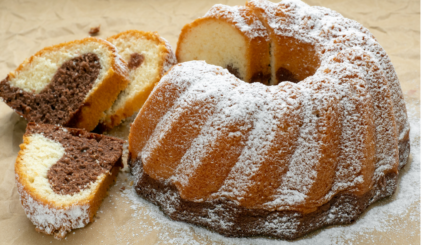Dairy foods aren’t immediately associated with Hanukkah, but Syrian Jews prepare delicious cheese-filled pancakes called atayef for the Festival of Lights. These filled, syrup-soaked delicacies honor Judith, an unlikely heroine, whose story is customarily read during Hanukkah.
In the apocryphal Book of Judith, we read that in his quest to conquer Judea, an Assyrian warrior named Holofernes besieged the town of Bethulia. Though Bethulia’s elders were ready to surrender, Judith, a widow, entered the Assyrian camp and gave Holofernes salty cheese to make him thirsty and wine to make him drunk. After he became intoxicated, she seized his sword and beheaded him, bringing the head back to her village in a basket. The next morning when the Assyrian troops found the headless body of their leader, they fled in terror.
Though atayef are labor intensive, their delicate and delicious flavor is well worth the time spent in the kitchen. The rosewater syrup is an acquired taste; you can replace it with orange flower water for a different, but equally delicious flavor. Jennifer Abadi, a Syrian Jewish cook based in New York, made these pancakes with her grandmother, Fritzi, around Hanukkah time. She graciously shares the recipe here.
Atayef (Stuffed Syrian Pancakes)
Makes 48 pancakes
With your help, My Jewish Learning can provide endless opportunities for learning, connection and discovery.
Adapted from A Fistful of Lentils (Harvard Common Press) by Jennifer Felicia Abadi.
For Rosewater Syrup:
3/4 cup cold water
2 cups sugar
1 tablespoon plus 2 teaspoons rose water
1 tablespoon fresh lemon juice
For Filling:
1/2 cup cold water
1/2 cup whole milk
3 heaping tablespoons dried cream of rice cereal
1 1/2 tablespoons sugar
1 teaspoon rose water (optional)
1 cup whole-milk ricotta cheese
For Pancakes:
2 cups unbleached all-purpose flour
1 teaspoon baking soda
1/2 teaspoon baking powder
1/2 teaspoon salt
1 tablespoon sugar
1 egg, lightly beaten
2 cups plus 1 1/2 tablespoons lukewarm water
2 cups vegetable oil
Make the Syrup:
Bring the water and sugar to a boil in a medium saucepan. Reduce heat and simmer, stirring occasionally, for 12-15 minutes, until liquid thickens slightly. Remove from heat and immediately stir in rosewater and lemon juice. Cool, then transfer to an airtight container. Refrigerate until very cold, for 5-6 hours or overnight. Keeps for up to 1 month in the refrigerator.
Make the Filling:
Combine the water and milk in a saucepan and bring to a boil. Add the cereal, lower heat and stir for 30 seconds. Remove from heat, cover and let stand for 3 minutes. Transfer to a medium-sized bowl and add the sugar, rose water, and ricotta. Mix well to combine and reserve.
Make the Pancakes:
Combine the flour, baking soda, baking powder, salt, and sugar in a large bowl. Add the egg and blend well.
Grease a large skillet or griddle with oil and heat until very hot. Pour batter, about 1 1/2 tablespoons at a time, onto the skillet to form 3-inch round pancakes. When undersides are browned and pancakes appear dry, remove to a platter and reserve.
While pancakes are still warm place a heaping tablespoonful of cheese filling in the center of each pancake. Fold pancake in half and pinch edges with fingers until well-sealed (do six pancakes at a time, then fry, to ensure that the pancakes are warm enough to make the edges seal together). Heat 1 cup oil over medium-high heat in a medium saucepan. Using a slotted spoon gently lower the pancakes into the hot oil 2-3 at a time and fry until dark brown, being careful not to burn, 1 1/2 to 2 minutes.
Remove the pancakes from the oil and immediately submerge in the syrup, turning to coat and soaking for 1 minute, adding additional syrup as necessary.
Drain pancakes in a colander and serve warm or at room temperature.
Hanukkah
Pronounced: KHAH-nuh-kah, also ha-new-KAH, an eight-day festival commemorating the Maccabees' victory over the Greeks and subsequent rededication of the temple. Falls in the Hebrew month of Kislev, which usually corresponds with December.


